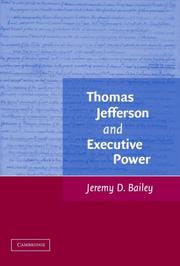| Listing 1 - 2 of 2 |
Sort by
|

ISBN: 9780521868310 9780511509742 9780521127387 9780511350153 0511350155 051150974X 1281086223 9781281086228 0521868319 0521127386 1107179327 9781107179325 9786611086220 6611086226 1139132407 9781139132404 0511351054 9780511351051 0511349297 9780511349294 0511348320 9780511348327 Year: 2007 Publisher: Cambridge [etc.] Cambridge University Press
Abstract | Keywords | Export | Availability | Bookmark
 Loading...
Loading...Choose an application
- Reference Manager
- EndNote
- RefWorks (Direct export to RefWorks)
By revisiting Thomas Jefferson's understanding of executive power this book offers a new understanding of the origins of presidential power. Before Jefferson was elected president, he arrived at a way to resolve the tension between constitutionalism and executive power. Because his solution would preserve a strict interpretation of the Constitution as well as transform the precedents left by his Federalist predecessors, it provided an alternative to Alexander Hamilton's understanding of executive power. In fact, a more thorough account of Jefferson's political career suggests that Jefferson envisioned an executive that was powerful, or 'energetic', because it would be more explicitly attached to the majority will. Jefferson's Revolution of 1800, often portrayed as a reversal of the strong presidency, was itself premised on energy in the executive and was part of Jefferson's project to enable the Constitution to survive and even flourish in a world governed by necessity.
Executive power --- United States --- History --- Jefferson, Thomas --- Politics and government --- 1783-1809 --- History. --- Jefferson, Thomas, --- Social Sciences --- Political Science
Book

ISBN: 1498510957 0739177486 9780739177488 1299714897 9781299714892 9780739177471 0739177478 9781498510950 Year: 2013 Publisher: Lanham Lexington Books
Abstract | Keywords | Export | Availability | Bookmark
 Loading...
Loading...Choose an application
- Reference Manager
- EndNote
- RefWorks (Direct export to RefWorks)
Enlightenment and Secularism is a collection of twenty eight essays that seek to understand the connection between the European Enlightenment and the emergence of secular societies, as well as the character or nature of those societies.
Enlightenment. --- Secularism. --- Ethics --- Irreligion --- Utilitarianism --- Atheism --- Postsecularism --- Secularization (Theology) --- Aufklärung --- Eighteenth century --- Philosophy, Modern --- Rationalism
| Listing 1 - 2 of 2 |
Sort by
|

 Search
Search Feedback
Feedback About UniCat
About UniCat  Help
Help News
News